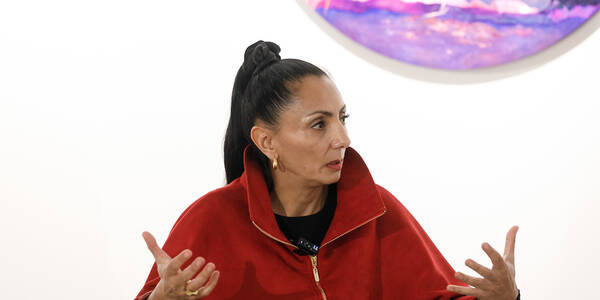IdentificarX Film Festival celebrates films by our Latina/e/o/x alumni
ArtCenter’s two-day IdentificarX Film Festival on July 19 and 20—at the Ahmanson Auditorium on the College’s Hillside Campus—showcased a wide range of alumni-made films as part of programming for the ArtCenter exhibition IdentificarX celebrating our Latina/e/o/x alumni.
The exhibition, which opened in June, is exhibited across four galleries throughout ArtCenter’s South Campus—the Peter and Merle Mullin Gallery, the Second Level Galleries, the Hutto-Patterson Exhibition Hall and the Hoffmitz Milken Center for Typography (HMCT) Gallery—and features more than 100 artists and designers. It closes on August 3.
The first day of the IdentificarX Film Festival featured nuanced and powerful documentaries and dramas, with Q&As after between Los Angeles-based Mexican American filmmaker Olivia Sandoval (MFA 21 Film)—one of IdentificarX's curators—and several of the films’ directors.
A new IdentificarX documentary directed, written and produced by multiracial Mexican American filmmaker Ana Lydia Ochoa-Monaco (BFA 18 Film), one of IdentificarX's curators, featured interviews with alumni in the exhibition, and explored themes of Latina/e/o/x identity, diversity and experience at ArtCenter. “When I walk into a room, I make sure the door doesn’t close behind me,” said Bolivian American, L.A.-born and Portland, Oregon-based artist and Adidas Senior Designer Harold Arandia Jr. (BS 99 Product Design) in the documentary.
The 2022 short documentary Bad Hombrewood, by Mexican director, producer and screenwriter Guillermo Casarín (BFA 19 Film), tackled Hollywood's lack of representation of the Latina/e/o/x community. The film—selected in more than 50 international film festivals—featured interviews with emerging Latina/e/o/x alumni filmmakers, and renowned creators, including Mexican director Guillermo del Toro, Coco co-director Lee Unkrich, and Spider-Man: Into the Spider-Verse and Spider-Man: Across the Spider-Verse Cuban American co-writer and co-producer Phil Lord. “Our limits are not the ones you set for us,” said del Toro in the film.
When Sandoval, after the documentary’s screening, asked Casarín how he was able to get interviews with famous directors such as del Toro, Casarín said it wasn’t easy. When he answered a call from del Toro, the Academy Award-winning director said he was busy working on different projects, so Casarín—interrupting him—was direct in his pitch.
“I told him, ‘I don’t want you because you are famous, and you have many Oscars—of course it’s going to help the film—BUT the reason I want you is because you inspired me to become a filmmaker, to pursue this career in 2006 after watching [del Toro’s film] Pan’s Labyrinth, and what we want to do with this film is inspire people,’” said Casarín. “When I told him that, you could hear him kind of go, ‘Ahhh. I can’t say no.’”

Short dramas screened during the first day of the IdentificarX Film Festival included 2019’s Prom Time, whose director of photography is Colombian-born cinematographer Luisa Betancur (BFA 17 Film). The film centered on a mom who accidentally drugs herself with Chinese herbal medicine, and spirals into a gaudy sexual fantasy with a hunk, while her two teen daughters get ready on prom night. The experimental 2021 short film Here and There, by writer, director and producer Diego Andoni Rubio (BFA 23 Film), focused on a young ballerina, disillusioned with dancing, who takes a trip with a stranger, and confronts her self-destructive tendencies.
In the Fold, by Mexican film director and producer Manuel Del Valle (BFA 21 Film), made its L.A. film premiere at the IdentificarX film festival, after debuting in June at the 2024 Tribeca Film Festival as part of Indeed’s Rising Voices. The program amplifies stories by BIPOC filmmakers, in partnership with Emmy Award-winning writer Lena Waithe and her company Hillman Grad Productions and 271 Films. Del Valle created the 2024 film as one of 10 Rising Voices filmmakers selected from over 700 applicants to create short films around the theme “the future of work.” In the film—set in a family-owned restaurant—customers receive personalized fortune cookie fortunes generated on-the-spot by computer algorithms, with impactful consequences.
“This is a very cathartic film for me,” said Del Valle, who mentioned that he had been accepted into the Rising Voices program less than a month before he found out that his sister had cancer, and that that news took him down a rabbit hole of statistics. “To make this film about letting go of the statistics, and just focus on the moment, and celebrate generic inspiration—the idea of ‘dude, life is going to be better’—that creates a future, if you believe it,” he said.
Future projects for del Valle, he said, include him finishing up development on his first feature film The Unexpected Symptoms of a Peculiar Heart; working on the stop motion animation short Sandclouds: The Feather Thief with the team, in Mexico, behind the 2022 Oscar-winning animated film Guillermo del Toro’s Pinocchio; writing a television pilot; and co-writing another film. The alum credited Film Assistant Professor Matthew Rolston (BFA 78 Photography and Imaging) for teaching him the importance of making a good pitch deck. Del Valle sold his first feature film even before he wrote it, because of his pitch deck for it, he said.

L.A. based Mexican American writer, director and filmmaker Carlo Olivares Paganoni (BFA 12 Film), who has written and developed animated content, as well as directed commercials, promos and live-action short films, screened his Student Emmy Award-winning 2012 short film Cardboard Camera—his thesis film when he graduated from ArtCenter.
The film tells the story of an imaginative 10-year-old boy who can’t afford a video camera, creates his own cardboard camera, and makes a film—with his friends—to enter a children’s film festival. During the drama film's Q&A after the screening, Paganoni brought up some members of the cast—then children, now adults—and said the film was similar to his own story.
“I remember wanting to make films, but I didn’t have a camera at the time,” said Paganoni, who grew up in Mexico. “My family was going through an economic crisis, and in Mexico. My dad sold his house, and that money became less. My dad is an architect, and I would go to his office, and he had folders. I would grab the folders, cut them, and make a camera, with a view finder, and shoot a film, and draw what I imagined shooting. That became the idea for the film.”
Mexico-born Canadian storyteller and filmmaker Fernando Arrioja (BFA 94 Film) screened his 2016 short film A Man’s Story, an emotional drama about masculinity and violence, and the winner of the Impact award for best short film at the ReelWorld Film Festival. The film featured a young boxer, following an explosive boxing practice, confronting his father—in exile after war—about domestic abuse of him and his mother.
When both Paganoni and Arrioja were asked during the drama films Q&A, by Bad Hombrewood director Casarín, in the audience, how the way they made films had evolved, both had different—and thoughtful—answers. Paganoni also mentioned being asked to work on a new undisclosed project with a story group at Walt Disney Imagineering.
“When I graduated, I felt like I had to be doing things all the time for me to get better, to learn,” said Paganoni. “I feel now like it’s the opposite, especially with filmmaking. I’m happy if I have one or two projects every half a year or five months. In between those dips, your whole spirit, body and mind processes everything that’s going on.”
“I believe that every event, that every little thing you look at, can become a story,” added Arrioja. “Where you place the camera, how you place the camera, depends on what that subject is, and how you find the best way to tell the story. I progress to directing from the page. I focus on what’s on the page—literally commas and periods—and I try to become the conduit from the writer into the actors. I have found, since then, that that’s the best way to create magic on screen.”

The second day of the festival focused on comedy and animation, with Q&As between Sandoval and the preent featured filmmakers.
In Honey, I’m Home (2019) by director, actress and writer Gaby Mendez (BFA 19), a 1950s housewife tries to persuade her husband to go on a trip to Peru over turkey dinner in the middle of July.
Next up was Sandoval’s Love, and the Deadly Virus (2022), which she wrote and directed after the COVID-19 pandemic derailed plans for her senior thesis film. In Love, and the Deadly Virus, amid a pandemic, a hypochondriac seamstress has her world turned upside down when she meets a handsome dancer on a dating app. Their restrained passion compels her to put aside her fear of infection and figure out an unusual method to get closer to him.
In a Q&A after the screening, Sandoval explained that the film was shot in April 2021 in Korea Town and Malibu. “There was still a pandemic going on,” Sandoval explained. “It was more relaxed than in 2020, but we couldn’t shoot without facemasks and we needed to have a COVID officer on set.” She went on to explain that, due to the pandemic, she was not able to complete her thesis film at ArtCenter, but that she felt compelled to shoot a film for herself after studying film grad school. She added, “The movie serves as a time capsule reminder of how things were.”
When one person in the audience said the film felt very Latino, Sandoval responded, “I wanted to bring my Hispanic culture and roots into the film as much as possible. The actors, one is Italian and one is from Spain. (laughs) I think they did a great job.”
The comedy shorts block concluded with El Triste (2020) by del Valle, in which an ragdoll-like marionette, goes on a journey of self-acceptance and discovery as he does whatever it takes to prove to himself and his fellow puppets that he is valuable and worthy of admiration.

The animation block started with Paganoni’s Santo y Los Clones (2004; 13 minutes), which he created for Cartoon Network Latin America. Set in Mexico city, the film follows the adventures of El Santo as a superhero who must try to stop the plans of Dr. Clone, an evil scientist, who is determined to dominate the world by creating clones of El Santo’s old enemies.
Next up was Casarín’s Balam (2023; 10 minutes), in which Itzel, a young girl of Mayan descent, gets lost in the jungle while on a stargazing trip with her father. Alone, and on the run from a furious poacher, Itzel stumbles across a lost city deep in the jungle and comes face-to-face with Balam, a spirit guide, who shows her how to read the stars and plot a way out.
The animation block concluded with Quarantine Shenanigans (2020; 1 minute) by Los Angeles-born music video director and stop-motion filmmaker Jude Chacon (MFA 21 Film). In the stop-motion animation PSA, a robot figurine and cotton ball suggest what to do and not to do during the COVID-19 pandemic.
In a Q&A following the animation block, Sandoval asked all three directors what the biggest challenge they faced during the making of their films. “We really wanted to capture the culture in an authentic way and not just being a caricature of the Mayan culture,” Casarín answered. “I was very nervous and I worked very hard to be respectful.”
“It was actually pretty easy,” Chacon answered with a laugh. “I did it during the first couple of weeks of the pandemic. And because it’s stop motion, I didn’t have to work with anyone else. So, it was easier, but everyone knows that stop-motion animation is time-consuming.”
Paganoni explained that his film was actually supposed to be the pilot episode of a series starring the legendary lucha libre wrestler Santo. The whole crew was moved to L.A. to create the show, but then the network dropped their support. “It was hard to convince them that they were missing a golden opportunity. This is El Santo. This is our Batman, our Superman, our James Bond, all together,” he said. “The [network] didn’t believe in him. They thought luchadores should be funny. Nacho Libre had just come out. They asked, ‘Can you make him funny?’ And I said, ‘No, that’s not El Santo.’”

The evening concluded with the U.S. premiere of the comedy Todas Menos Tú (2024), the first feature film by established director Luis Kuri (BFA 95 Film), who previously directed commercials and an episode of Érase Una Vez. In Todas Menos Tú, while vacationing, a group of friends discover their friend’s fiancée is cheating on him. Together they embark on a mission to collect evidence and save their friend from marrying someone who, besides being a cheater, is a horrible person.
After the screening, Kuri began his Q&A portion by saying, “It's really important for me to be back here at ArtCenter. This is one of my favorite places on Earth.”
During the nearly hour-long Q&A, Kuri talked about how the entirety of the film was shot on a resort in Tulum in Mexico. The film was scheduled for a 30-day shoot, but he finished it in 27 days. When an audience member called the film a romantic comedy, Kuri gently corrected him, “It’s been marketed as a romantic comedy, but it’s not. It’s just a comedy. A rom-com generally ends with a happy ending, but I didn’t want that. I said, ‘I’m not doing a happy ending.’”
When asked about the future of the film, Kuri was happy to report that the film ended up showing in 1,000 theaters in Mexico. Though it couldn’t beat Madame Web at the box office, it was # 2 for three straight weeks. To date, it’s the # 1 film for the Cinépolis chain of theaters in Mexico this year and it’s the # 4 film overall this year for Mexican films. “They’re thinking of making a sequel,” said Kuri. “There’s already a synopsis for what the sequel should be. And it’s hilarious.”







